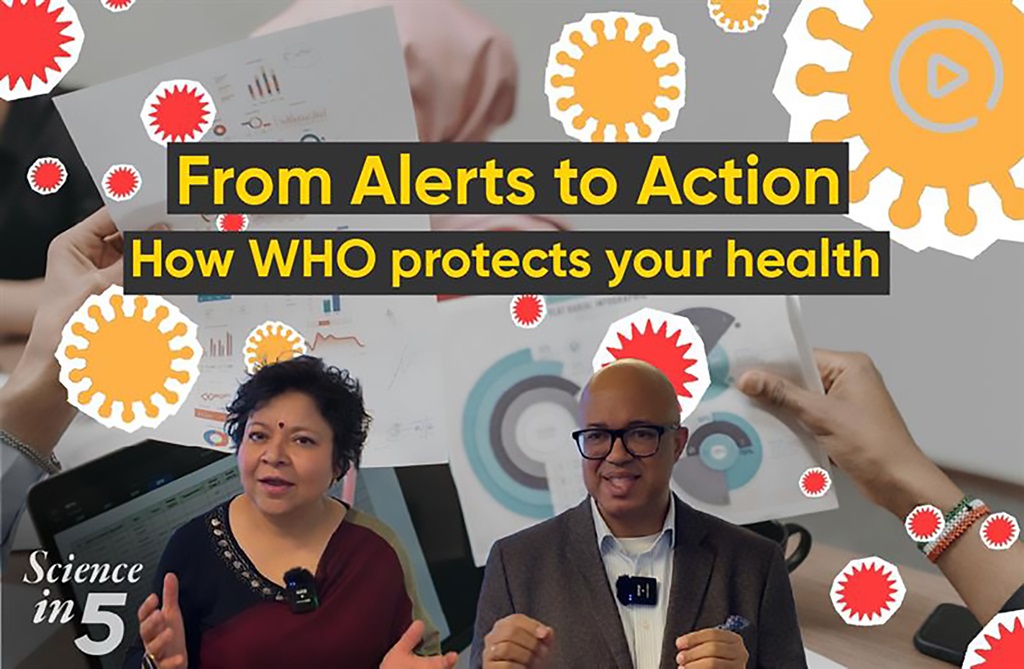Episode #132 - From alerts to action - How WHO protects your health
Alternative media
Related links
Transcript
VGS We are here in the emergencies operations centre of WHO’s headquarters in Geneva. This is where WHO receives over one hundred thousand signals every month. Any of these signals could be a real health threat, an outbreak or even a pandemic. So how do scientists and WHO, together, decide which one of these signals could be a potential outbreak? We are here with Dr Chikwe Ihekweazu, today to discuss just that. Welcome Dr Chikwe. Why are there so many threats, health threats, that we receive signals for?
CI So, all around the world something is happening. Sometimes it’s obvious to us, there are floods somewhere, there’s a heatwave, there is conflict and there are always health consequences. But sometimes there are these little bugs, like viruses or bacteria, that cause a new disease outbreak. You know, a cluster of people ill or dying from one thing or the other. So, everywhere around the world, it is nature and some of it is obvious to us and some are not and our work is to have a system where we can find these and make sure that we, as a joined humanity, has a way of responding to these threats wherever they are happening.
VGS So, these signals, what do they look like? Where are they coming from?
CI What we call signals, are really anything unusual. Sometimes there are more people in your local hospital. Sometimes we find people having diseases which we don’t expect young people to have or different demographics in any society to have. And sometimes it’s just we hear more people are dying in parts of the world. Or sometimes it’s very obvious, you know, there’s a flood, there’s war, there’s conflict and people are dying. So this is really what we respond to and our role is to understand what is usual and what is unusual and respond to that that is not normal and make sure that, with our partners in countries with our colleagues who are working at the different levels all over the world, that we have a way of identifying what is happening, defining what is usual, what is unusual and then, devoting our resources to responding to the unusual.
VGS What’s the process of sifting that we go through?
CI So we have a system which really works in every country through which a lot of this work is done. Some of it is automated it scans through all the media sources newspapers, radio, social media and sometimes does phone calls from doctors working in some clinics around the world. So, a lot of the early part of this work is automated. Then we use artificial intelligence to sieve out the noise and ultimately, we have to go through a process we call verification which very often means that someone is picking up a phone, calling their colleague somewhere in the community saying, “Listen, we heard this, what is going on?” Sometimes we arrange for a sample to be taken from a group of people and sent to a lab to confirm what disease is happening. So, it’s a process called verification and the point is really to sieve out what requires an organized response and what a local hospital can manage on its own.
VGS What is the role that the countries play in this entire process?
CI At the heart of this work is that no country, no community, no hospital can do it on its own because we need to work together. Things can only be more than expected if you know what to expect and what they expect is really an average of what happens globally. So for this work to work we have to collaborate, collaborate between countries, collaborate between the humans, the animal sector, colleagues working in the environment, if these three parts of our response are not working together, we don’t get it right. So it requires a lot of collaboration around different professions, across different countries, continents and also, of course, people working in the different sectors.
VGS As an individual, what can we do?
CI So, a role every individual can play is an addition to all the roles we have. We should also all think of ourselves as health detectives. So when you see something unusual happening in your community, whether it’s children getting ill, whether it’s more people dying, or whether you just see that the weather has changed so much and people are just not the same. You can make sure your local health authority is informed or maybe just your local doctor. Just make sure that, if your sense is that something unusual happened with a population, a group of people that you work with. You might be a teacher, you might be a doctor you might just be a leader in a community. Make sure someone knows about it that they can then inform the local health authority and they will ultimately pass that information to the World Health Organization.
VGS Thank you, Dr Chikwe. Here’s to you, our audience, being the next disease detective, and reporting anything unusual that might be going on in your part of the world. Until next time then, stay safe, stay healthy and stick with science.

